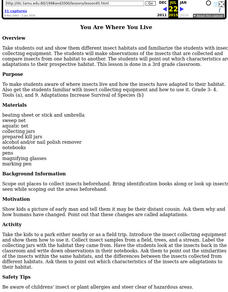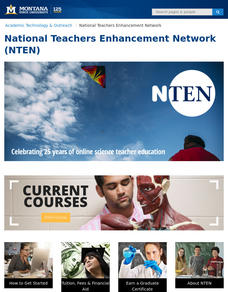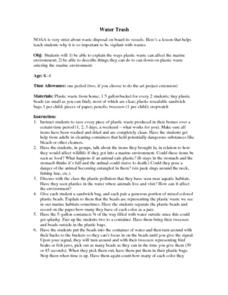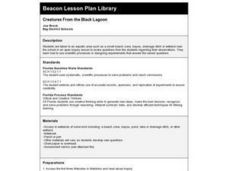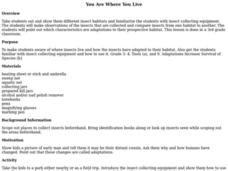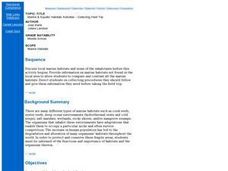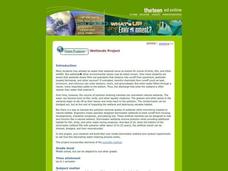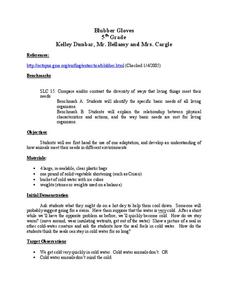Curated OER
There Are Algae in Your House!
Students demonstrate that, although we sometimes can neither smell nor taste them, many ingredients in our foods and household products come from the sea. They also investigate food eat to determine algae derivatives they contain.
Curated OER
You Are Where You Live
Students explore where insects live and how they have adapted to their environment.
Curated OER
Investigation 11 - Utah Fish
Fourth graders examine a particular Utah fish and then create a poster that shares what they learned. They access websites imbedded in this plan to aide them in their research.
Curated OER
Whale Form and Function
Students identify similarities and differences in specializations of morphology among a variety of cetaceans and approximate the reasons for these specializations.
Curated OER
Life in Streams and Ponds
Students collect microorganisms, demonstrate correct laboratory/Gram stain procedure, and design and construct tables to organize data.
Curated OER
Water Trash
Students explain the ways plastic waste can affect the marine environment. They are able to describe things they can do to can down on plastic waste entering the marine environment.
Curated OER
Creatures From the Black Lagoon
Seventh graders make observations at a beach zone, bayou, pond, lake or drainage ditch, or other wetland.
Curated OER
Teaching about the Chemistry of Oxygen Solubility
Learners explore solubility of gases in water, Henry's Law, LeChatelier's Principal, and supersaturation of gases in water.
Curated OER
Beaches of the Delaware Estuary
Learners examine estuaries in Delaware. They, in groups, gather samples of water to find organisms and identify them.
Curated OER
You Are Where You Live
Third graders observe insects in a number of habitats. They recognize which insect characteristics are adaptations to their habitats.
Curated OER
Build a Bug
Students design an ideally adapted macroinvertebrate to live in a water habitat. They illustrate their animal, name it and specify the adaptations it has that enable it to survive.
Curated OER
Benthic Bingo
Students identify organisms of a benthic community. They place the correct organism in the correct community and practice using marine terms. They play this game like a game of bingo.
Curated OER
Collecting Field Trip
Students identify and describe each marine habitat. They name organisms that can be found in each habitat and discover ways in which to protect them. They participate in an activity to complete the lesson.
Curated OER
Understanding Estuaries
Young scholars work together to develop their own estuarine ecosystem in an aquarium. They observe the aquarium daily and record them in a notebook. They discuss the different interactions they see with the class.
Curated OER
Coastal Development
Students examine how a coastal area changes after it has been developed. They discover the impact of development on the environment. They illustrate their own non-developed area and change it into a developed area.
Curated OER
The Incredible Journey
Students study salmon and steelhead. They play a game in which they act out the salmon and steelhead journey from their spawning ground, to the open ocean, and then back to the spawning ground again. They identify obstacles these fish...
Curated OER
Fish In The Web of Life
Students will develop skills of fish identification, correlate habitat characteristics with species present, develop a working vocabulary of Oneida fish terminology and fish names and discuss the relationship between a healthy ecosystem...
Curated OER
Water Quality
Students are presented with a hypothetical situation to investigate the water quality of the James River. They are given data to analyze and put into the graphic organizer that is included to help solve the problem. The activity includes...
Curated OER
Wetlands Project
Students discover how wetlands filter out contaminants before they can reach other bodies of water. In groups, they design and build a model of a stormwater wetland. They test the water quality and inform their classmates about the...
Curated OER
Light My Fire ...Fly
Students examine fire flies. They measure the frequency of light stimulus used by communicating fire flies. Students explore the concept of organisms using light to communicate. Students film the fire flies and quantify the duration...
Curated OER
Blubber Gloves
Fifth graders examine animal adaptations and how they meet their needs in a variety of environments. They discuss how they might adapt to their own environment before discussing how an animal could adapt. Next, they complete an...
Curated OER
Macroinvertebrate Simon Says
Students study the four groups of macroinvertebrates. In groups, they explore the characteristics of macroinvertebrates. Through playing a "Macroinvertebrate Simon Says" game, students discover the adaptations of the animals and their...
Curated OER
Salinity Of Soil
Fourth graders investigate the contents of various types of soil to determine the differences in salinity levels. They conduct an experiment of observing the plants in the different soils. Students then determine survival rates by...
Curated OER
Types of Legs
Students identify the characteristics of the legs of arthropods as well as how they are used. They compare and contrast the legs of various types of bugs in the arthropod family. A comparison worksheet is included in with this lesson.



